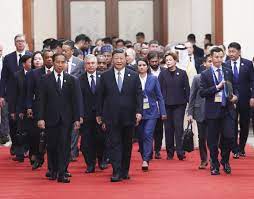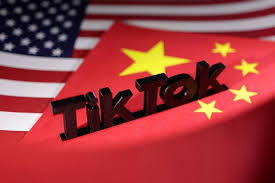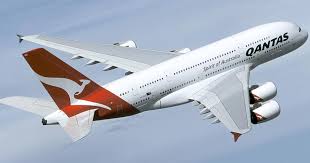As he began a summit on his flagship Belt and Road infrastructure program on Wednesday, Chinese President Xi Jinping promised international businesses increased access to China’s enormous market and more than $100 billion in fresh financing for other emerging economies.
China’s links with Africa, Asia, Latin America, and the Middle East have been strengthened as a result of Xi’s initiative, which has built power plants, roads, railways, and ports all over the world. However, the large loans supporting the projects have left poorer nations with hefty debts, which in some cases have led to China seizing control of those assets.Xi promised that the China Development Bank and the Export-Import Bank of China would each set up 350 billion yuan ($47.9 billion) lending windows at the forum’s opening ceremony in the elaborate and opulent Great Hall of the People. Beijing’s Silk Road Fund will receive an additional 80 billion yuan ($11 billion) in investments to help fund BRI initiatives.
According to Xi, “We will completely remove barriers to foreign investment access in the manufacturing sector.” He said that China would further “expand market access for digital products” and “cross-border trade and investment in services,” as well as reform state-owned businesses and areas like the digital economy, intellectual property rights, and public procurement.The substantial backing from Beijing comes at a time when both foreign investment and China’s economy have stalled.
In light of increased competitiveness and diplomatic tensions, Xi made reference to measures made by the United States and its allies to lessen their reliance on Chinese manufacturing and supply chains. He also reaffirmed Beijing’s commitment to improving the business environment for international companies.
We don’t participate in ideological conflict, geopolitical games, or political clique conflict, Xi declared. “We oppose unilateral sanctions, economic coercion, and the decoupling and severance of chains,” the statement reads, making reference to initiatives elsewhere to diversify industrial supply chains.
Chinese allegations that these actions are intended to slow down China’s development were reiterated by Xi, who claimed that “viewing others’ development as a threat or taking economic interdependence as a risk will not make one’s own life better or speed up one’s development.”China can only prosper when the rest of the world does, he claimed. “The world will improve even more when China succeeds.”
The forum is being attended by delegations from more than 130, primarily developing nations, including at least 20 heads of state and government. Vladimir Putin, the president of Russia, was present, demonstrating China’s diplomatic and economic support for Moscow amid the exclusion brought on by its involvement in the conflict in Ukraine.
Immediately following Xi, Putin addressed the forum and commended BRI as being “truly important, global, future-oriented, and aimed at creating more equitable, multipolar world relations.”
“This is truly a global plan,” he said, adding that it is consistent with Russia’s goal of creating a sizable Eurasian region where like-minded individuals may cooperate and communicate and where various integration processes will be connected. He also mentioned other regional groups including the Association of Southeast Asian Nations (ASEAN), the Eurasian Economic Union, and the security-focused Shanghai Cooperation Organization.The ambassadors of France and Italy to China as well as the former French Prime Minister Jean-Pierre Raffarin left the room during Putin’s speech and came back.
The only other member of the European Union government present at the forum is Viktor Orbán, the prime minister of Hungary, whom Putin saw on Tuesday. Since the commencement of Russia’s war in Ukraine in February 2022, the Russian president has only occasionally met with a European leader.Post-inauguration, Putin and Xi had a meeting.
The presidents of Indonesia, Argentina, Kazakhstan, Sri Lanka, Kenya, and other nations were also there, in addition to U.N. Secretary-General António Guterres. The majority of Western European nations and American allies sent inexperienced or ex-officials to the meeting.
While emphasizing the necessity for initiatives to be environmentally friendly, Guterres noted the BRI’s ability to bring development to underserved areas. He asserted that the program might accelerate the move away from dependency on fossil fuels.
“Developing countries will need massive support for a fair, equitable, and just energy transition towards renewables while providing affordable electricity to all,” Guterres stated.In addition, he demanded an “immediate, humanitarian” halt to hostilities in the Israel-Palestine conflict following a Tuesday attack that left hundreds dead in a hospital in Gaza City.
With the BRI, China has surpassed the World Bank as a significant financier of development initiatives. According to the Chinese government, the effort has “galvanized” about $1 trillion in investment and more than 3,000 projects.China’s “debt trap” diplomacy has also drawn condemnation from the US, India, and other countries: Making loans that Beijing knew the governments would probably not be able to repay allowed Chinese interests to seize the assets. A port that the Sri Lankan government ultimately decided to lease to a Chinese corporation for 99 years is an often-cited example. According to several economists, China did not purposefully make faulty loans.
According to Steve Tsang, director of the SOAS China Institute in London, one major question is whether the BRI can reduce its debt load.
After a decade of large-scale projects that boosted trade but left behind significant debts and sparked environmental worries, the program now aspires to become smaller and greener. China would also “monitor the debt sustainability of BRI countries more closely,” according to a report by Christoph Nedopil, director of the Asia Institute at Griffith University in Australia.
He continued, “Chinese financial institutions will probably limit their exposure to projects that do have consistent internal cash flows.” However, “beautiful” strategic projects like key ports or railways will continue to have Chinese financial backers.

















